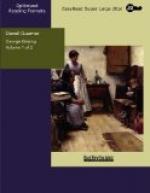“I have wanted to see you,” he said, regarding her anxiously. “Lily has got over it much better than I expected; but it won’t do—she can’t go on in this excitement.”
“I have just seen her at your sister’s. She doesn’t look very well”
“Could I venture to ask one more kindness of you, Mrs. Wade? May she come to you, say the day after to-morrow, and stay over night, and over polling-day?”
“I shall be very glad indeed,” faltered the widow, with something in her face which did not seem to be reluctance, though it was unlike pleasure.
“Are you quite sure that it isn’t asking too much of you? At my sister’s she is in a perpetual uproar; it’s worse than at home. And I don’t know where else to send her—indeed I don’t. But I am getting frightened, that’s the truth If she could be with you during the polling-day”——
“How can you hesitate to ask such a simple thing?” broke in Mrs. Wade. “Shall I ask her myself?”
“You are a good friend. Your conversation will have a soothing effect. She likes you so much, and gives such weight to everything you say. Try to set her mind at ease, Mrs. Wade; you can do it if any one can.”
“I will write to her, and then call to-morrow.”
Again Lilian had a night without thorough rest, and for the greater part of the next day she was obliged to keep her room. There Mrs. Wade visited her, and they talked for a long time; it was decided that Lilian should go to Pear-tree Cottage on the following afternoon, and remain in seclusion until the contest was over.
She came down at five o’clock. Denzil, who had instructed the servants that she was at home to no one, sat with her in the library, holding her hand.
“I am quite well,” Lilian declared again and again. “I feel quite easy in mind—indeed I do. As you wish it, I will go to Mrs. Wade’s, but”——
“It will be very much better. To tell you the truth, girlie, I shall feel so much freer—knowing you are out of the row, and in such good care.”
She looked at him.
“How wretched to be so weak, Denzil! I might have spared you more than half what you have suffered, if I hadn’t given way so.”
“Nonsense! Most women would have played the coward—and that you never could! You have stood it bravely, dear. But it’s your health I fear for. Take care of it for my sake.”
Most of the evening he was away, and again the whole of next morning. But when the time came for her to leave, they were sitting once more, as they had done so often, hand in hand, their love and trust stronger than ever, too strong to find expression in mere words.
“If I go into Parliament,” said Denzil, “it’s you I have to thank for it. You have faced and borne everything rather than disappoint my aims.”
He raised her fingers to his lips. Then the arrival of the carriage was announced, and when the door had closed again, they held each other for a moment in passionate embrace.




